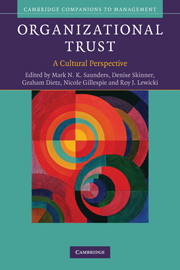Book contents
- Frontmatter
- Contents
- List of figures
- List of tables
- Note on editors
- Note on contributors
- Foreword
- Editors' acknowledgements
- Part I The conceptual challenge of researching trust across different ‘cultural spheres’
- Part II Trust across different ‘cultural spheres’: inter-organizational studies
- 5 Examining the relationship between trust and culture in the consultant–client relationship
- 6 Checking, not trusting: trust, distrust and cultural experience in the auditing profession
- 7 Trust barriers in cross-cultural negotiations: a social psychological analysis
- 8 Trust development in German–Ukrainian business relationships: dealing with cultural differences in an uncertain institutional context
- 9 Culture and trust in contractual relationships: a French–Lebanese cooperation
- 10 Evolving institutions of trust: personalized and institutional bases of trust in Nigerian and Ghanaian food trading
- Part III Trust across different ‘cultural spheres’: intra-organizational studies
- Part IV Conclusions and ways forward
- Index
- References
6 - Checking, not trusting: trust, distrust and cultural experience in the auditing profession
Published online by Cambridge University Press: 05 June 2012
- Frontmatter
- Contents
- List of figures
- List of tables
- Note on editors
- Note on contributors
- Foreword
- Editors' acknowledgements
- Part I The conceptual challenge of researching trust across different ‘cultural spheres’
- Part II Trust across different ‘cultural spheres’: inter-organizational studies
- 5 Examining the relationship between trust and culture in the consultant–client relationship
- 6 Checking, not trusting: trust, distrust and cultural experience in the auditing profession
- 7 Trust barriers in cross-cultural negotiations: a social psychological analysis
- 8 Trust development in German–Ukrainian business relationships: dealing with cultural differences in an uncertain institutional context
- 9 Culture and trust in contractual relationships: a French–Lebanese cooperation
- 10 Evolving institutions of trust: personalized and institutional bases of trust in Nigerian and Ghanaian food trading
- Part III Trust across different ‘cultural spheres’: intra-organizational studies
- Part IV Conclusions and ways forward
- Index
- References
Summary
Corporate culture [is] one of those ink-blots in which we see what we want to see.
Charles Hampden-Turner, 1990: 11Summary
This chapter explores the interaction of trust and distrust with the associative cultural tiles of organizational and professional values, operating within individual auditors in accounting firms. Building on recent research into trust and culture in healthcare management, the authors consider the way in which this particular professional context (i.e. cultural sphere) affects trust, and at how trust and distrust can exist co-terminously in the same auditor. The chapter shows how an auditor's trust and distrust in their clients affects their professional judgments and decisions, and how sound auditing judgments may run counter to the accounting firm's needs. Findings include the revelation that less effective, highly trusting auditors tend to stay within the profession but more effective, less trusting auditors leave.
Introduction
Although there is an extensive literature in management studies examining organizational cultures and their influence on firm performance (e.g. Barney, 1986; Pheysey, 1993; Sackman, 1997), little is written in the accounting literature about the role of culture in accounting practice. To this end, a very recent synthesis in Behavioural Research in Accounting (Jenkins et al., 2008) of accounting-firm culture and governance concludes that there is a ‘paucity’ of research in all areas of accounting culture (2008: 49). Such a relative lack of interest in the accounting literature is in spite of the fact that accounting regulators themselves view sound organizational culture as critical to protecting the public good (PCAOB, 2004), because it helps prevent intentionally fraudulent misstatement.
- Type
- Chapter
- Information
- Organizational TrustA Cultural Perspective, pp. 156 - 181Publisher: Cambridge University PressPrint publication year: 2010
References
- 3
- Cited by

